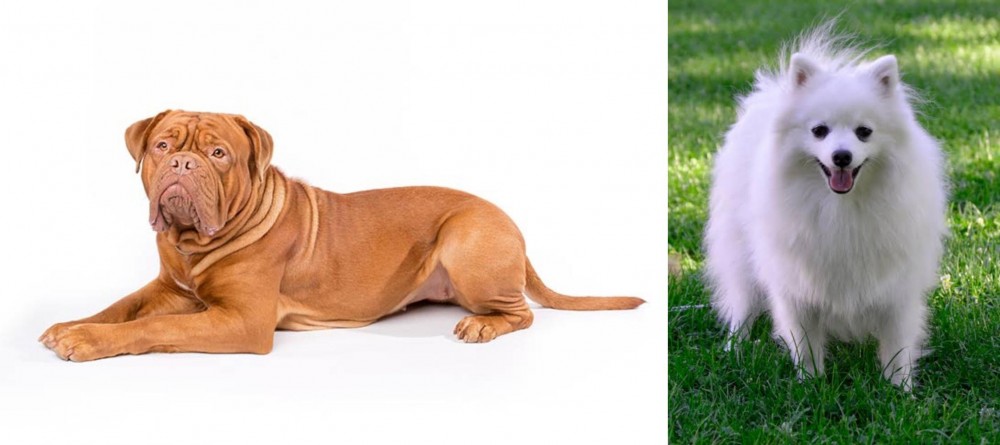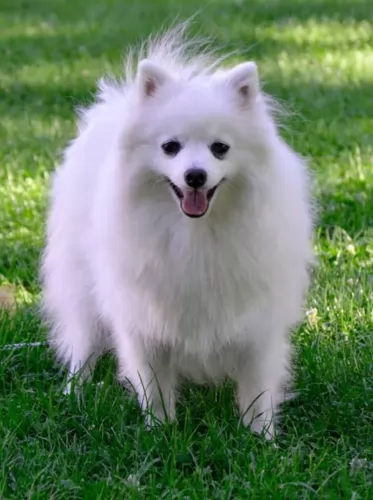 Petzlover
Petzlover Dogue De Bordeaux is originated from France but Volpino Italiano is originated from Italy. Dogue De Bordeaux may grow 37 cm / 15 inches higher than Volpino Italiano. Dogue De Bordeaux may weigh 53 kg / 117 pounds more than Volpino Italiano. Dogue De Bordeaux may live 6 years less than Volpino Italiano. Both Dogue De Bordeaux and Volpino Italiano has almost same litter size. Dogue De Bordeaux requires Low Maintenance. But Volpino Italiano requires High Maintenance
Dogue De Bordeaux is originated from France but Volpino Italiano is originated from Italy. Dogue De Bordeaux may grow 37 cm / 15 inches higher than Volpino Italiano. Dogue De Bordeaux may weigh 53 kg / 117 pounds more than Volpino Italiano. Dogue De Bordeaux may live 6 years less than Volpino Italiano. Both Dogue De Bordeaux and Volpino Italiano has almost same litter size. Dogue De Bordeaux requires Low Maintenance. But Volpino Italiano requires High Maintenance
 The Dogue de Bordeaux is an ancient French dog breed and his history goes so far back that it is difficult to have accurate records of his origin.
The Dogue de Bordeaux is an ancient French dog breed and his history goes so far back that it is difficult to have accurate records of his origin.
During the 1700s he was used as a guard dog, with theories suggesting that several Mastiff type breeds were the closest ancestors.
For centuries the Bordeaux Mastiff, also referred to as the Bordeaux Bulldog, came in two size varieties, with the larger version being the Dogue de Bordeaux. It is this large dog which made its appearance in the Hollywood movie ‘Turner & Hooch’, shooting him into more recognition and interest.
 This Italian bred dog is Spitz-type and very ancient. The Spitz breeds have been around since at least 4000BC. Archeologists have found remains that match the Spitz heritage of fox like heads, curly tails, erect small ears. In Greece in 400BC there were engravings of these dogs. Michelangelo painted the breed as he lived with one. In 1888, the Queen of England – Victoria – brought 6 back to England from Florence.
This Italian bred dog is Spitz-type and very ancient. The Spitz breeds have been around since at least 4000BC. Archeologists have found remains that match the Spitz heritage of fox like heads, curly tails, erect small ears. In Greece in 400BC there were engravings of these dogs. Michelangelo painted the breed as he lived with one. In 1888, the Queen of England – Victoria – brought 6 back to England from Florence.
The Italians have loved the Volpino for centuries. These little dogs that resemble the Pomeranian so much but existed much before them. It was very early in the history of the domesticated dog that the Volpino moved from north to south. The Italians called them Volpino because it means foxy dog. They also called them Lupino which means wolfy dog.
The breed was never seen outside of its home range in Italy until the 1880’s and it is still a rare breed. However since the 1980’s the breeders of the American Eskimo brought some from Italy to the US and claimed they were American Ekimo runts. They interbred the Volpino with the American Eskimo creating the toy and mini Eskimo.
The Volpino was a guard dog alerting the Mastiffs to the presence of intruders. The Mastiff would then respond to the intruder. The Volpino was also a popular companion animal due to their easy temperament and their high intelligence level. However they grew less popular and by 1965 there were only a few registered dogs left. There was an attempt to revive the breed in 1984 when dogs that still lived on farms were used as new stock. Even with this, they remain a rare breed and only about 4000 are alive throughout the world.
The Volpino have been denied AKC registration or stock registration as they are considered to be too much like the American Eskimo Dog. However they are recognized by the FCI, the UKC, the ENCI (Italian National Kennel Club), the North American Volpino Club, the Volpino Italiano Health and Genealogy Club and the Volpino Club of America.
 The Dogue de Bordeaux is a large molosser type dog with a large head, standing at 60 – 67cm and weighing anything between 54 and 65kg. His weight comes more from his muscular, powerful build rather than his height.
The Dogue de Bordeaux is a large molosser type dog with a large head, standing at 60 – 67cm and weighing anything between 54 and 65kg. His weight comes more from his muscular, powerful build rather than his height.
He is a powerful looking dog and his short coat is loose-fitting and is an attractive rich reddish brown color. There are wrinkles around the face with the nose being somewhat pinkish-orange as opposed to black.
The eyes are wide apart and are hazel. He has short to medium length floppy ears and where once the thick tail was docked, giving him a powerful, distinctive look, it is mostly left long today.
He is a confident, self-assured, territorial dog who will require training and socialization if he is to know his place in the home. He is a powerful mastiff-type dog, who without training can be stubborn, arrogant and somewhat aggressive towards strangers.
His looks and his territorial nature make him an excellent watchdog. He is no push-over and isn’t a good choice for the first time dog owner.
Without a strong, firm owner, he could prove difficult to handle. He is calm and laid back with children in the home and he can get along well with other pets if he has been brought up with them since puppy-hood.
 The Volpino is about the same size as the Pomeranian and smaller than the American Eskimo Dog. They are a rare breed and they have a soft, thick coat and they can be red, white or champagne. With the pointed ears and muzzles, they do look like a fox. They have large thick tails curling over their back and they have double coats.
The Volpino is about the same size as the Pomeranian and smaller than the American Eskimo Dog. They are a rare breed and they have a soft, thick coat and they can be red, white or champagne. With the pointed ears and muzzles, they do look like a fox. They have large thick tails curling over their back and they have double coats.
 The Dogue de Bordeaux isn’t a big, boisterous kind of dog but is rather calm and relaxed. As a watchdog however, he can surprise you and become quite active, showing agility for such a hulk.
The Dogue de Bordeaux isn’t a big, boisterous kind of dog but is rather calm and relaxed. As a watchdog however, he can surprise you and become quite active, showing agility for such a hulk.
He can adapt to life in the city or the country but even though he appears lazy, he will need moderate daily exercise.
He loves his human family and wants to be constantly with them. He is stubborn but will do well with training and socialization.
Calm and easy-going and with his easy-to-maintain short, soft coat, be prepared for some drooling and snoring from this loving, devoted large pet of yours.
 The Dogue De Bordeaux doesn’t have as long a lifespan as many other dogs, but with good care, can go to 7 – 10 years of age.
The Dogue De Bordeaux doesn’t have as long a lifespan as many other dogs, but with good care, can go to 7 – 10 years of age.
Because he is a brachycephalic breed – a short-nosed dog such as the Boxer, Pug and Bulldog – he may well have the same number of teeth as other dogs, but the teeth are crowded, putting dogs like this at higher risk of getting dental disease.
His teeth will need to be brushed 2 or 3 times a week to prevent plaque and tartar getting trapped.
Brachycephalic Syndrome is also something to watch out for with your Dogue de Bordeaux. It’s an upper respiratory disorder which can bring on difficulty with breathing because of the crowding of tissue and narrower airways.
 The Italian Volpino has better health than most dogs due to so much isolation for so many years. However they are susceptible to some diseases and genetic issues.
The Italian Volpino has better health than most dogs due to so much isolation for so many years. However they are susceptible to some diseases and genetic issues.
• PLL Primary Lens Luxation – Genetic mutation of the eye. Very painful and usually occurs between 4 and 8 years of age. Usually results in euthanasia.
• Patellar Luxation – moving knee cap – can result in lameness and/or arthritis.
 He isn’t the most active dog and he is inclined to snooze quite a bit throughout the day. It will nonetheless be a good idea to include him in your daily walks and allow him to take part in a ball game now and again.
He isn’t the most active dog and he is inclined to snooze quite a bit throughout the day. It will nonetheless be a good idea to include him in your daily walks and allow him to take part in a ball game now and again.
The Dogue de Bordeaux needs to be fed a high-quality dog food in keeping with his large size and age.
This dog is known for drooling, and because of his wrinkled face, you’ll need to be watching the facial area that it is kept clean and dry to avoid skin infections. Check his ears at the same time to ensure they are free from dirt and wax.
The short coat does shed throughout the year, and you will need to be brushing him down twice a week to remove all those loose hairs.